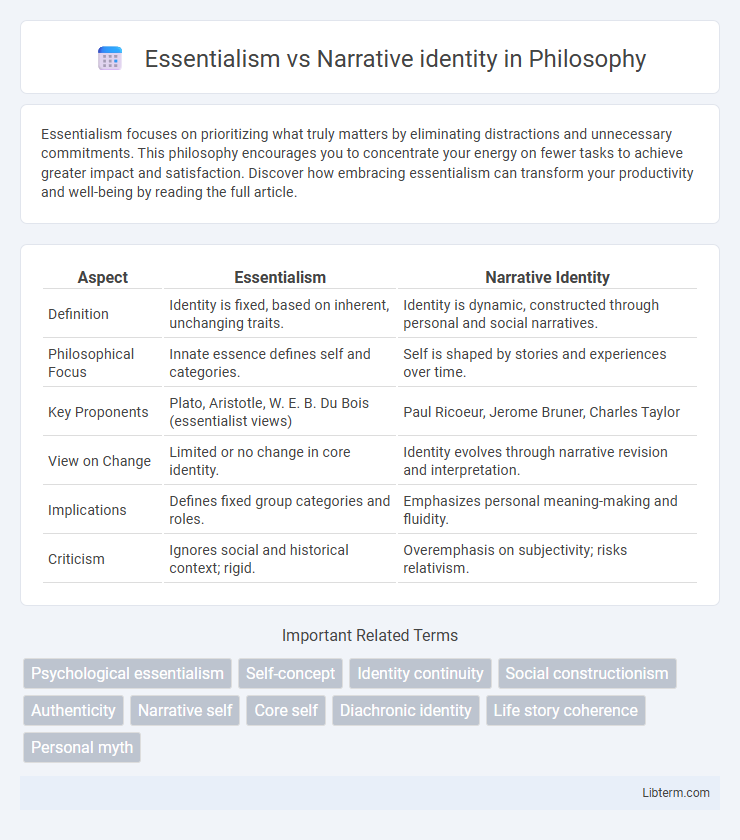Essentialism focuses on prioritizing what truly matters by eliminating distractions and unnecessary commitments. This philosophy encourages you to concentrate your energy on fewer tasks to achieve greater impact and satisfaction. Discover how embracing essentialism can transform your productivity and well-being by reading the full article.
Table of Comparison
| Aspect | Essentialism | Narrative Identity |
|---|---|---|
| Definition | Identity is fixed, based on inherent, unchanging traits. | Identity is dynamic, constructed through personal and social narratives. |
| Philosophical Focus | Innate essence defines self and categories. | Self is shaped by stories and experiences over time. |
| Key Proponents | Plato, Aristotle, W. E. B. Du Bois (essentialist views) | Paul Ricoeur, Jerome Bruner, Charles Taylor |
| View on Change | Limited or no change in core identity. | Identity evolves through narrative revision and interpretation. |
| Implications | Defines fixed group categories and roles. | Emphasizes personal meaning-making and fluidity. |
| Criticism | Ignores social and historical context; rigid. | Overemphasis on subjectivity; risks relativism. |
Understanding Essentialism: Core Concepts
Essentialism posits that individuals possess an inherent, unchanging essence that defines their identity across time and situations. This core self serves as the foundation for understanding personal traits, values, and behaviors as stable and consistent. Contrasting with narrative identity, essentialism emphasizes fixed characteristics rather than evolving self-stories shaped by experiences.
Defining Narrative Identity
Narrative identity is defined as the internalized and evolving story individuals construct to make sense of their experiences, shaping their sense of self over time. Unlike essentialism, which posits fixed traits or core self, narrative identity emphasizes personal meaning, coherence, and the integration of past, present, and anticipated future events. This construct is central in psychology and philosophy for understanding how people create continuity and purpose in their lives through storytelling.
Historical Roots of Essentialism
Essentialism traces its historical roots to Plato's theory of Forms, which posits that immutable essences define the true nature of entities. This philosophical foundation emphasizes inherent characteristics as the core determinants of identity, contrasting with the fluid and evolving nature of narrative identity. Essentialism influenced early psychological theories that viewed personality traits as fixed and biologically based, shaping debates on the stability versus construction of the self.
The Evolution of Narrative Identity Theory
Narrative identity theory evolved as a response to essentialism by emphasizing the fluid, constructed nature of selfhood through personal storytelling rather than fixed traits. Pioneered by psychologists like Dan McAdams, the theory highlights how individuals create coherent life narratives that integrate past experiences and future aspirations, shaping identity dynamically over time. This shift from essentialist views to narrative frameworks underscores the role of culture, memory, and meaning-making in identity development.
Comparing Essentialism and Narrative Identity
Essentialism asserts that individuals possess an inherent, unchanging core self that defines their identity, while narrative identity emphasizes that identity is constructed through the ongoing integration of life experiences into a coherent story. Essentialism prioritizes fixed traits and biological or psychological essences, contrasting with narrative identity's dynamic and evolving nature shaped by personal reflection and cultural context. Comparing these theories highlights the tension between viewing identity as stable and innate versus fluid and constructed through storytelling.
Impacts on Personal Development
Essentialism emphasizes fixed traits and innate qualities, shaping personal development through a stable sense of self that resists change. Narrative identity highlights the evolving story individuals construct about their lives, promoting growth by integrating experiences and adapting self-perceptions. Both frameworks influence self-understanding, with essentialism fostering consistency and narrative identity encouraging flexibility in personal growth trajectories.
Cultural Influences on Identity Formation
Cultural influences play a crucial role in shaping both essentialist and narrative identity perspectives by providing shared symbols, values, and traditions that form the core of individual and collective self-understanding. Essentialism emphasizes fixed traits inherited through cultural heritage, while narrative identity highlights how people construct their life stories within cultural contexts, constantly interpreting and reinterpreting experiences. These cultural frameworks shape identity formation by influencing how individuals perceive themselves and their roles in society across time.
Essentialism vs Narrative Identity in Psychology
Essentialism in psychology posits that individuals possess a core, unchanging essence that defines their identity across time and contexts. Narrative identity theory challenges this by emphasizing that identity is constructed through evolving personal stories and experiences, highlighting the fluid and dynamic nature of self-concept. Research in developmental and social psychology explores how these perspectives influence understanding of personality stability and change throughout the lifespan.
Critiques and Controversies
Essentialism faces critiques for its rigid view of identity as fixed and unchanging, often ignoring individual experiences and social contexts. Narrative identity is challenged for potentially oversimplifying personal identity by prioritizing coherent life stories, which can marginalize fragmented or evolving selves. Both approaches provoke controversy over their adequacy in capturing the fluid and multifaceted nature of human identity.
Practical Implications for Self-Understanding
Essentialism posits that individuals possess a core, unchanging essence that defines their identity, while narrative identity emphasizes the self as a continuously evolving story shaped by experiences. Practically, essentialism supports self-understanding through recognizing stable traits, aiding consistent decision-making and self-coherence. In contrast, narrative identity encourages reflective growth and adaptability by integrating life events into a cohesive self-narrative, promoting psychological resilience and personal development.
Essentialism Infographic

 libterm.com
libterm.com